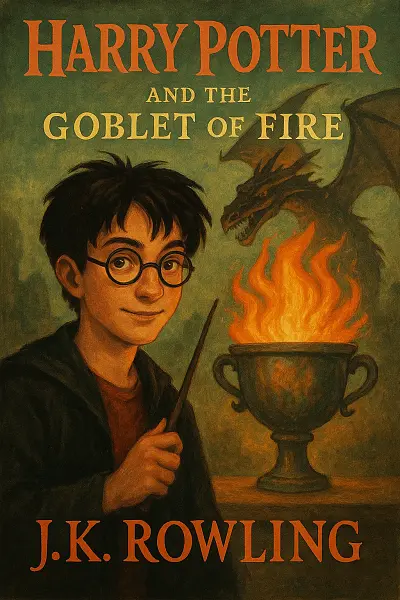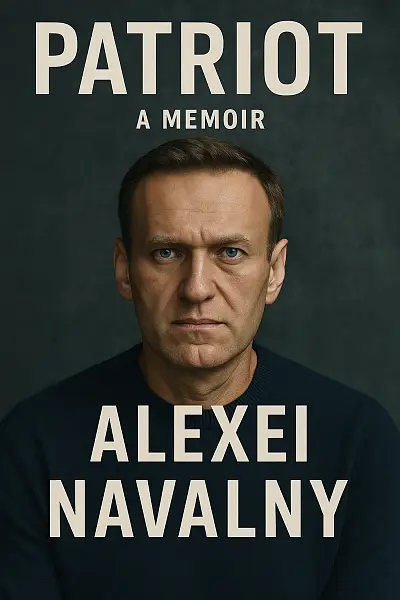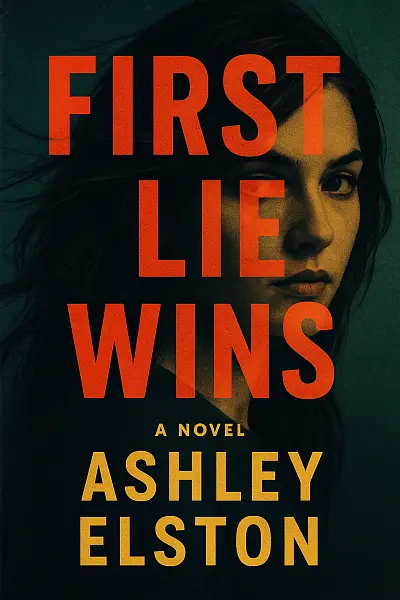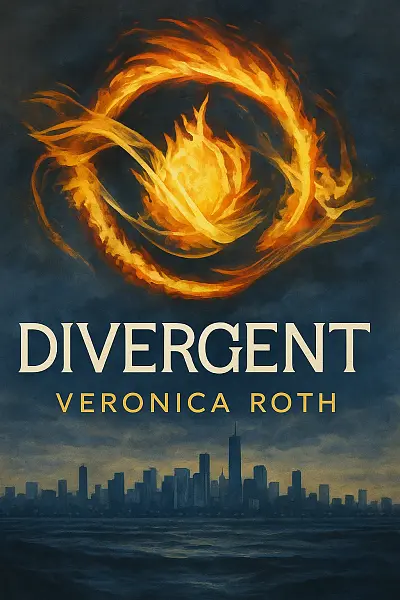
Divergent
by: Veronica Roth
Beatrice Prior lives in a rigidly divided Chicago where your chosen faction defines everything. Facing her own doubts and longing for more than selfless conformity, she’s torn between staying loyal to her family’s Abnegation roots or embracing her true nature. When the big Choosing Day arrives, Beatrice shocks everyone—and herself—setting off a wave of uncertainty.
Thrown into the wild, adrenaline-fueled world of Dauntless, she renames herself Tris and lands in a brutal initiation process. As alliances form and enemies close in, Tris must prove her worth while hiding a dangerous secret about who she really is.
Struggling with heart-pounding challenges and a will-they-won’t-they romance, Tris confronts what it truly means to belong. Roth’s style is thrilling, high-stakes, and intimately emotional, pulling you straight into Tris’s conflicting loyalties and skyrocketing tension.
""Courage is not the absence of fear, but the choice to defy the limits others place on who you can become.""
Let's Break This Down
The Author's Voice
Atmosphere
- Expect a gritty, high-stakes world painted with sharp contrasts—from tense, sterile Dauntless corridors to freedom-tinged rooftop scenes.
- The mood is charged and urgent, underscoring a sense of danger and rebellion.
- Dystopian tension pulses beneath the surface, creating a landscape that always feels a heartbeat away from chaos.
Prose Style
- Roth delivers succinct, direct sentences—there's no meandering here, just efficient, cinematic descriptions.
- Dialogue feels snappy and true-to-life, making conversations especially immersive.
- Tons of sensory moments—expect to feel every punch, taste fear, and see the city’s crumbling edges.
- While not flowery or ornate, the writing pulls you along quickly and never gets bogged down in unnecessary detail.
Pacing
- Action is king—scenes tumble one into the next with just enough introspection to catch your breath.
- There’s a relentless forward motion—even quiet scenes buzz with anticipation, and chapters practically demand to be read in one sitting.
- Occasional world-building info-dumps can briefly slow things, but momentum always returns fast.
Characterization
- Characters are vivid but sometimes archetypal—you’ll immediately “get” Tris’s conflict and motivations.
- Internal struggles are brought front and center, making it easy to connect to the protagonist’s evolving confidence and fears.
- Supporting cast often gets less nuance, but dynamic relationships and shifting alliances keep everyone interesting.
Theme and Tone
- Big questions about self-identity, loyalty, and freedom come up again and again, but conversations never feel preachy.
- The tone is intense and earnest, with emotional stakes ramped up to the maximum through loyalty tests, romantic sparks, and ideological clashes.
Overall Rhythm
- Think nonstop momentum with frequent cliffhangers—perfect for readers who thrive on tension and can’t resist late-night page-turning.
- If you crave adrenaline-fueled stories, clear but vivid writing, and an atmosphere buzzing with high-stakes choices, you’ll find Roth’s style totally addictive.
Key Moments
-
Jump-or-Fail: Tris’s heart-pounding leap into Dauntless initiation changes everything
-
Fear landscapes: Roth’s raw, adrenaline-charged simulations pull you into Tris’s psyche
-
Faction over family—choosing Dauntless sparks loyalty battles and heartbreaking sacrifices
-
Four’s mysterious scars and stoic charm—seriously, one of YA’s most memorable mentors
-
Knife-throwing scene sizzles with tension, rebellion, and a dash of forbidden chemistry
-
“I am Divergent.”—the secret that could get Tris killed, or save them all
-
Ruthless final chapters: betrayal, chaos, and a gut-punch ending that doesn’t let go
Plot Summary
Tris Prior lives in a dystopian Chicago divided into five factions, each devoted to a different virtue. At the Choosing Ceremony, she shocks her family by leaving Abnegation for Dauntless and soon discovers she's Divergent, meaning she doesn't fit into any one faction. As she trains for initiation, Tris uncovers a plot by Erudite to overthrow Abnegation, using Dauntless as their weapon. The conflict erupts as Dauntless members are mind-controlled to kill Abnegation, forcing Tris and her allies to resist and expose the truth. In the climax, Tris’s parents die helping her, and after disabling the mind control, she escapes the city with a few survivors, forever changed by loss and betrayal.
Character Analysis
Tris Prior starts timid and self-doubting but gradually grows fearless and self-assured, driven by a desire for identity and belonging. Four (Tobias), her mentor, is stoic and mysterious, shaped by a traumatic past, finding strength and vulnerability through his relationship with Tris. Both characters undergo significant growth—challenging their internalized beliefs, discovering courage, and learning the cost of standing apart. The antagonists, particularly Jeanine Matthews, embody the dangers of unchecked ambition and the urge for control, forcing Tris and her friends into tough moral choices.
Major Themes
Identity and choice are at the heart of Divergent; Tris’s struggle to define herself beyond societal expectations underscores the value of individuality. The novel explores the dangers of conformity, with the faction system literally dividing society and punishing difference—seen most clearly in the treatment of Divergents. Sacrifice and loyalty run throughout, as Tris experiences profound losses in the name of protecting others, highlighting the complexity of bravery. Power and corruption are exposed through Erudite’s manipulations, raising questions about who should have control and how truth can be distorted for personal gain.
Literary Techniques & Style
Veronica Roth writes in a fast-paced, first-person present tense, immersing the reader in Tris’s perspective. The narrative is filled with kinetic energy, short chapters, and suspenseful cliffhangers that make it a compulsive read. Symbolism is woven through with tokens like Tris’s tattoos and the choosing ceremony, representing personal transformation and identity. Roth uses metaphors of simulation and testing to reflect internal conflicts, while her world-building balances concrete detail with just enough ambiguity to keep readers questioning the reality of faction life.
Historical/Cultural Context
Divergent is set in a post-apocalyptic future Chicago, shaped by fear of human nature’s flaws and a reactionary turn toward order through rigid social structure. Written in the early 2010s, the series reflects cultural anxieties about identity, social conformity, and authoritarianism. The novel's themes and structure draw from the wave of dystopian young adult fiction (like The Hunger Games), amplifying real-world concerns about groupthink, surveillance, and individuality.
Critical Significance & Impact
The book became a massive hit among young adult and dystopian fans, praised for its engaging plot and relatable, flawed heroine. While critics sometimes question its world-building and some character motivations, Divergent reignited interest in dystopian narratives and inspired major film adaptations. Its influence is still felt in discussions about YA literature, especially in how it addresses self-determination, resistance to oppressive systems, and the courage to be different.
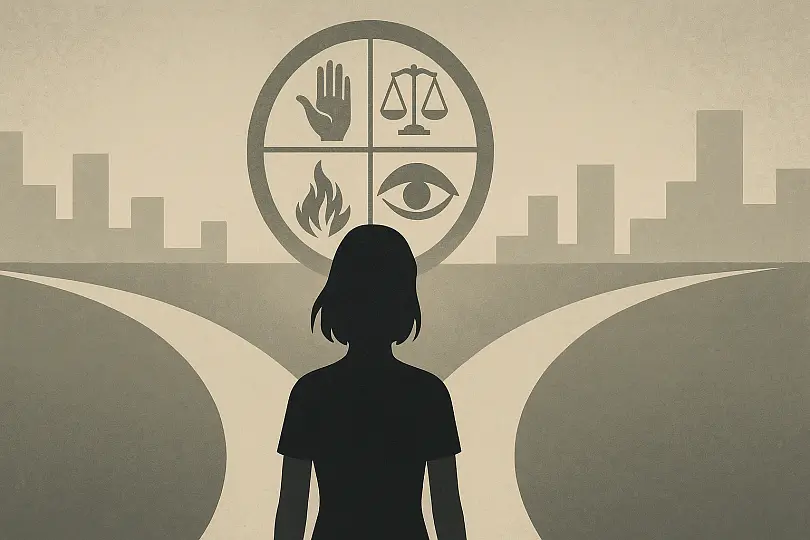
Choosing who you are means defying a fractured, dangerous society.
What Readers Are Saying
Right for You If
If you're into dystopian worlds, fast-paced action, and strong heroines, then I think you'll totally vibe with Divergent. This book basically has your name on it if you loved things like The Hunger Games or The Maze Runner—there’s a lot of that same “society is messed up, let’s rebel” energy going on.
- Big on coming-of-age stories? You’ll probably connect with Tris as she figures out who she really is (with plenty of adrenaline, of course).
- Love a bit of romance mixed into your sci-fi? There’s definitely some swoon-y moments, but it never takes over the plot.
- Fans of plots with big twists and lots of faction drama—you’ll fly through these pages.
If you’re someone who prefers deep, subtle world-building or really complex, nuanced characters, you might feel like some parts are a little on-the-nose or straightforward. There’s a lot of action and less focus on beautiful prose, so if you’re here for lyrical writing and slow-burning plots, this might not totally scratch that itch.
- Not into teen drama or angsty decisions? It could feel a bit much.
- Folks looking for heavy, philosophical explorations might want something a little more layered.
Bottom line: If you want something exciting, emotional, and totally absorbing (and you don’t mind a bit of youthful melodrama), Divergent is super readable and honestly hard to put down. Just don’t expect Tolstoy—it’s more like the ultimate popcorn flick of YA novels!
What You're Getting Into
Get ready for a wild ride in a futuristic Chicago where society is split into five factions, each dedicated to a different virtue.
Tris Prior, our bold and curious protagonist, faces a life-defining choice that puts her at the heart of a high-stakes struggle, forcing her to question who she is and where she truly belongs.
With intense training, secret alliances, and the constant threat of danger, Divergent is a fast-paced, adrenaline-charged YA adventure that’ll keep you guessing and rooting for Tris from page one!
Characters You'll Meet
-
Beatrice "Tris" Prior: The gutsy main character who leaves her selfless Abnegation faction to embrace the daring life of Dauntless. Tris’s quest for identity and her struggle with belonging fuel both the action and the emotional core of the story.
-
Tobias "Four" Eaton: The enigmatic Dauntless instructor with a tough exterior and a haunted past. He’s fiercely loyal and principled, guiding Tris while facing his own fears and striving to break free from his upbringing.
-
Christina: Tris’s quick-witted, fiercely loyal friend from Candor who supports her through thick and thin. Christina adds humor and heart, but their friendship faces tough tests as Dauntless trials grow darker.
-
Will: The brainy, affable recruit from Erudite who forms a close bond with Tris. Will's intelligence and loyalty shine, but his arc is tinged with tragic consequences that underline the novel’s darker themes.
-
Jeanine Matthews: The calculating and power-hungry Erudite leader whose manipulations spark the conflict. Jeanine’s intellect and ruthlessness make her a formidable antagonist, driving much of the danger Tris faces.
More Like This
If you tore through The Hunger Games by Suzanne Collins, you’re likely to be instantly hooked by Divergent’s swift pacing, adrenaline-fueled training sequences, and high-stakes society, where survival depends on conformity—or making a stand. Both novels thrust strong, yet vulnerable heroines into fractured worlds that force them to confront not only external threats, but also their own identities, making for plenty of gripping page-turning moments.
At the same time, fans of The Maze Runner by James Dashner will spot familiar threads—secretive groups, mysterious tests, and friendships tested under pressure. While The Maze Runner leans into maze-like literal confusion, Divergent emphasizes the maze of the mind, exploring fears, choices, and the pressure to belong. Both stories build tension through claustrophobic settings and never quite let readers (or characters) catch their breath.
Visually, imagine mixing the dystopian trials of Black Mirror with the coming-of-age drama of Divergent. There’s a similar pulse of paranoia and future-shock as characters wrestle with technology, surveillance, and a society bent on categorizing its citizens. If binge-worthy near-future dilemmas and questions about free will are your jam, you’ll recognize the philosophical edge in both.
Critic's Corner
What does it mean to be yourself when the world demands you belong to something else? Divergent asks this question with sharp urgency, pulling readers into a fractured future where identity is both weapon and shield. Roth's story doesn’t just probe the dangers of conformity—it wonders aloud how far we’ll go to protect the scraps of selfhood the system tries to erase.
Roth’s writing is taut, propulsive, and often visceral, excelling at pacing that keeps pages flipping. Action dives off the page with breathless immediacy, using present-tense narration to trap readers in Tris’s anxiety and exhilaration. Dialogue feels natural, especially among teens bristling with insecurity and bravado. Roth’s language is rarely ornate, favoring functional clarity over lyrical ambition—but, to her credit, this serves the relentless energy of the plot. She excels at staging set-pieces: claustrophobic training rooms, vertiginous jumps, and psychological simulations are described with a clarity that places readers inside Tris’s skin. Yet, one does sense the world-building can be stark—Chicago’s transformation feels sketched just enough to support the plot, but opportunities for richer cultural texture are sometimes left on the table.
Thematically, Divergent is unapologetically concerned with choice, agency, and resistance to categorization. The tight faction system serves as a powerful metaphor for modern anxieties around tribalism, social labeling, and the pressures young people face to define themselves too quickly. The novel highlights the costs of both assimilation and rebellion, using Tris’s “divergence” to probe deeper questions about whether true virtue or identity can be subdivided at all. Roth’s vision of society—orderly on its surface, fracturing beneath—resonates in an age wracked by ideological polarization and questions of belonging. The book refuses to offer simple answers, showing how each faction’s virtues might twist into violence or cruelty, and how courage often means refusing binaries. Roth threads timely concerns about surveillance, psychological manipulation, and the consequences of erasing difference—making the story feel urgent even a decade after publication.
Within the YA dystopian genre, Divergent holds its own against behemoths like The Hunger Games. Unlike Collins’s commentary on spectacle and violence, Roth zeroes in on the ethics of identity, setting her apart from imitators. While Tris’s journey is iconically familiar, her arc—soaked in self-doubt and unexpected toughness—lands emotional blows that echo across the genre. Roth reinvigorates old tropes by daring to question the very act of classification.
Divergent thrives on adrenaline and introspection, delivering characters readers can root for and a premise that dares to ask why difference frightens us so much. Is it flawless? No—the world sometimes feels underexplored, and certain supporting characters verge on archetype. Still, Roth’s debut is intensely readable, relevant, and brimming with heart, and it deserves its spot in the modern YA canon.
Community Thoughts
I ALMOST THREW THE BOOK WHEN TRIS JUMPED FIRST INTO THE NET. What kind of wild bravery is that? I couldn't sleep after, imagining the fall and the fear. This story just gets inside your head.
I honestly thought I’d just skim Divergent, but Tris’s jump into Dauntless territory grabbed me so hard I missed my bus stop. That leap felt so much bigger than just a scene; it was like watching someone become themselves in midair.
wait, can we talk about FOUR? because that man haunted my dreams for WEEKS. he’s mysterious, tough yet vulnerable, and every scene with him made my heart pound. how dare roth make a character this real?
okay but FOUR is honestly living in my head rent free, like why is he so mysterious and damaged and heroic all at once? i kept rereading his lines, just to feel the chills again.
So Tris just JUMPS OFF A ROOF and I swear my heart stopped. that scene had me questioning every brave thing I've ever done. If you crave adrenaline for breakfast, this book delivers.
Leave Your Review
Local Take
Why It Matters
Divergent by Veronica Roth really strikes a chord in the US because it taps into themes that echo loud and clear here:
-
Individualism vs. conformity: This is classic American territory! The faction system mirrors cultural battles over identity, freedom, and the pressure to fit in—a vibe that runs deep from the counterculture movements of the '60s right through to today’s debates around self-expression.
-
Resistance and rebellion: Roth’s story of standing up to oppressive systems gives off major echoes of the American Revolution and later civil rights struggles. There’s something so relatable about fighting for what’s right, no matter the cost.
-
Meritocracy and coming of age: The Choosing Ceremony almost feels like a metaphor for “the American Dream” narrative, but with a twist—it asks what happens when the dream squeezes people into boxes.
While dystopian fiction isn’t new to American literature, Roth’s focus on personal agency and questioning authority sits perfectly among classics like The Giver and The Hunger Games. The sense of forging your own path is just so... American!
Food for Thought
Controversy Summary
Divergent by Veronica Roth has sparked debate over its handling of violence among teens, as well as criticism for perceived similarities to other dystopian series like The Hunger Games. Some readers and critics also questioned the depth of its societal themes and the portrayal of faction-based identity.
Like what you see? Share it with other readers



